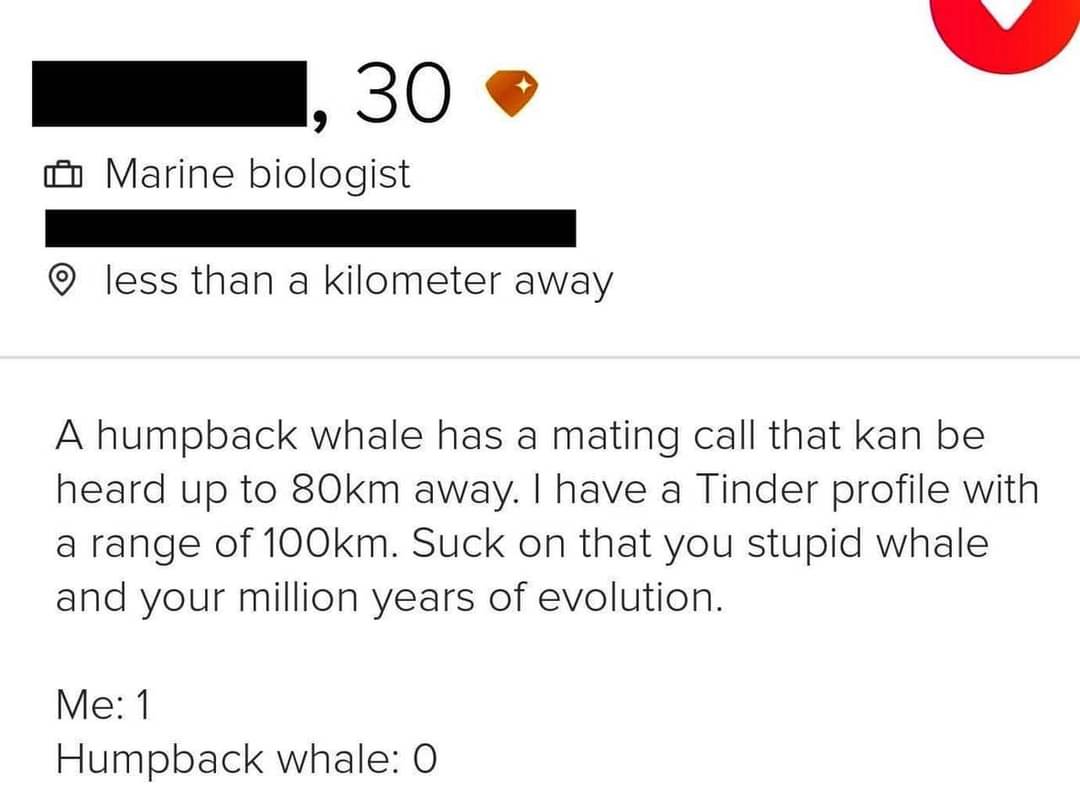Except that the humpback whale will reproduce long before that marine biologist loses his virginity.
Science Memes
Welcome to c/science_memes @ Mander.xyz!
A place for majestic STEMLORD peacocking, as well as memes about the realities of working in a lab.

Rules
- Don't throw mud. Behave like an intellectual and remember the human.
- Keep it rooted (on topic).
- No spam.
- Infographics welcome, get schooled.
This is a science community. We use the Dawkins definition of meme.
Research Committee
Other Mander Communities
Science and Research
Biology and Life Sciences
- [email protected]
- [email protected]
- [email protected]
- [email protected]
- [email protected]
- [email protected]
- [email protected]
- [email protected]
- [email protected]
- [email protected]
- [email protected]
- [email protected]
- [email protected]
- [email protected]
- [email protected]
- [email protected]
- [email protected]
- [email protected]
- [email protected]
- [email protected]
- [email protected]
- [email protected]
- [email protected]
- [email protected]
- !reptiles and [email protected]
Physical Sciences
- [email protected]
- [email protected]
- [email protected]
- [email protected]
- [email protected]
- [email protected]
- [email protected]
- [email protected]
- [email protected]
Humanities and Social Sciences
Practical and Applied Sciences
- !exercise-and [email protected]
- [email protected]
- !self [email protected]
- [email protected]
- [email protected]
- [email protected]
Memes
Miscellaneous
Well yes, humpback whales reach sexual maturity by around 10 years of age (some much before then it seems). A marine biologist is still practically in it's larval form at that point.
(Yes, yes, I know that wasn't what you meant, but I couldn't help myself)
The marine biologist:

I was scrolling comments to see if i am the only one who thought about him
Hmmm, let's see:
- Can't even spell "can" correctly. (dumb)
- Bad attitude towards animals. (mean spirited)
- Paid for premium. (desperate)
Yeah, I don't see women lining up around the block for this catch of a human being.
Unless it's the 52Hz whale. I'd shed a tear for that lonely creature; not for that biologist though.
It's like Wyle E Coyote finally gets an ACME rocket that's fast enough to catch the road runner, only to go zooming by the roadrunner on an upward trajectory headed for the moon.
“Well you asked the right guy. I’m a whale biologist. Though personally I hate whales. Especially Mushu.”
“Then why’d you become a whale biologist?”
“I don’t know you well enough to get into that.”
I see Futurama, I upvote.
Fun fact: every species on earth has been evolving for the same amount of time. Assuming that life wasn't spontaneously generated multiple times on planet Earth, which seems relatively unlikely.
For some reason, I feel oddly defensive about the whale being insulted. Suck on that you stupid marine biologist, you should understand evolution more better.
I mean if we assume that whales and us have been evolving for the same amount of time, it sounds like a skill issue on whales' part
Well, maybe he refers to the branch with the greatest common ancestor of us and whales. So our branch of evolution can have mating calls 100KM rather than their branch with measly 80KM
Yeah I guess, but that doesn't really help. Humans already killed most of the whales so rubbing in our technological superiority is quite gauche.
You never know if whales are going to get revenge for this kind of stuff someday 😅
Unless the nuclear war and global warming kill off 99.999% of us, making our infrastructure unsustainable, then our mating call goes back down to a fraction of a kilometer. Whales: 1, humans: 0.
Why does it seem unlikely life appeared more than once? My understanding was that when life started, the conditions were optimal for complex molecules to form (warm water, lots of organic compounds) so around that time (give or take half a billion year) it may have happened, but in very similar ways.
All known lofe on Earth uses the same base "toolset" to keep it simple while genetic analysis shows all known life is at least distantly related. While it isn't impossible that life developed multiple times on Earth, any other lineages were unable to compete and died off quickly.
It should also be noted how dramatically easier it is for existing life forms to hog all the available resources than it is for said resources to go through biogenesis. This is why scientists are unable to create life forms in labs, because no matter how sterile we try to make the conditions, some microbe finds a way in and thrives on the resoirce dense media that scientists are trying to recreate life with.
Biogenesis is crazy hard. Once that first lifeform appears it absorbs pretty much all available resources and takes over from there. All those conplex molecules just floating around get incorporated into the life form that appears first. Those primordial seas were constantly churning things about so life would have quickly spread across the ocean once it formed.
But that applies to life as we know it today right? The first life forms couldn't have taken over the earth instantly, they weren't battle hardened bacteria, but very simples beings, not far from overly complex proteins. Probably took at least some million years for a microbe to spread around the earth, just from the sheer size of it. So in that time, life could originate from other similar primordial soups.
Once they get going they reproduce like crazy. And there wouldn't have been any competition for that first life form, so is growth would only be hindered by how many nutrients were available. Churning oceans and storms would have spread that first life form would only needaybe a couple ~~centuries~~ millenia to spread across the Earth, while that leap from self replicateling macromolecules to actual life form would have simultaneously been way harder tham you think.
It just took some crabs a bit longer to get there.
Correction.
Me: 1
Whale: .8
Humpback gets laid though
Well, you can find whales on tinder, but sometimes they use a picture of a friend...
You can also find whales in charity events.
*can
How well sound propagates through water is highly dependent on the water temperature variations over depth. There can be conditions in which sounds can be trapped between two different horizontal "layers" and travel far greater distances than 80km.
Wow, that's cool. Completely makes sense but not something I'd thought about...
Would the temperature differences need to be very large for this effect to occur?
As sound travels through a water layer where the speed through which it travels varies with depth, the sound will tend to refract towards where it is the slowest.
A layer where temperature decreases as depth increases will refract sound downwards. A layer that has the inverse temperature properties will do the opposite. A layer that is isothermal (where the temperature remains constant as depth changes), will still tend to refract sound upwards because the increase in pressure also increases velocity, although not as strongly as temperature does, which is why temperature differences can easily overcome this effect where the water is not isothermal.
If you have a layer that refracts sound downwards on top of a layer that refracts sound upwards, you just created a sound channel, which acts as a wave guide in which sound will remain trapped and travel far longer distances horizontally before dissipating.
Ultimately you can't really put a number on the required temperature differences because there are many other factors to take into account like how steeply the speed of sound changes, how tall the layer(s) are, what is the frequency of the sound, or how much of it you want to remain "trapped" in the sound channel.
Holy crap that's bonkers! Thanks, you've blown my mind
He calls 'em like he sees 'em.
He does sound like he hates whales.
I bet he'd hate bears, if he were to switch fields.
No, apparently he *kalls them.
Whale biologist!
The sea was angry that day my friends.
Difference is, the whale is not a virgin though.
The range isn't how far away people can see you, it's how far away you can see other people. Even if you set your range to the minimum, you're still shown to everyone that has a range that includes your location
Wait, really? But if the ranges dot overlap then there’s no chance of a match, right? Or am I misunderstanding how tinder works?
If someone outside of your match radius matches with you, you actually still will be shown their card, so, if you really want to game the app, you set your radius to .1 or whatever, and then only match with people outside it, because those are guaranteed matches. By doing this, you make your Like to Match ratio skyrocket, which causes Tinder's algorithm to put you at the front of the list, and gets you even more matches
Oh interesting. I was told by someone once that you want to set your radius smaller which seemed counterintuitive but this explains why.
I paired up before online dating was really a thing but I’m always curious about this strange world I never experienced.
I've been in a committed relationship for almost five years now, so all I can do is pass on my knowledge lol
Length isn't everything you know. Unlike me, a humpback could hardly take a bus to the town square to release their mating call from the most efficient location
You gotta be pretty brave or stupid to call out the mating ability of something with "humpback" right there in the name
Just a language thing tho, in my native they are called hunchback whales 👀 not quite as impressive
We’re all forgetting one important factor: quality over quantity. First of all, the whale doesn’t just sit in one place to broadcast their 80km calls. We can’t really say that about a marine biologist; who more than likely is out to sea and away from anyone else using Tinder.
I’d bet those whales are getting more action than that marine biologist, despite having a “shorter” distance on their mating calls.
Suck on that, you stupid marine biologist and your decade of education and training.
Marriage material.
